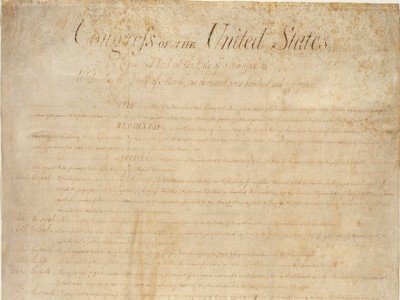[ad_1]
Right this moment we have fun the anniversary of the primary 10 amendments, often known as the Invoice of Rights (ratified December 15, 1791). Right here’s what you could know:
WHAT IT DOES
The ten amendments that make up the Invoice of Rights assure important rights and civil liberties:
— The First Modification ensures the liberty of faith, speech, the press, meeting, and petition.
— The Second Modification ensures the precise to bear arms.
— The Third Modification prohibits the pressured quartering of troopers.
— The Fourth Modification protects individuals from unreasonable searches and seizures.
— The Fifth Modification prohibits individuals from being subjected to double jeopardy or being pressured to testify in opposition to themselves; ensures that the federal government might ony deprive somebody of their “life, liberty, or property” by means of due strategy of legislation; and that personal property can’t be taken for public use, with out simply compensation.
— The Sixth Modification protects the precise to a good trial by jury.
— The Seventh Modification protects the precise to a jury trial in civil instances.
— The Eighth Modification prohibits extreme bail and merciless and weird punishment.
— The Ninth Modification emphasizes that the itemizing of sure rights within the Structure doesn’t imply that these are the one rights that belong to the individuals.
— The Tenth Modification states that any powers not granted to the federal authorities are reserved to the states and the individuals.
WHY IT WAS ADDED
One key debate surrounding the creation of the U.S. Structure was the inclusion of a Invoice of Rights. A number of delegates on the Constitutional Conference had been involved that with out a Invoice of Rights, our most vital rights could be unprotected. Others felt {that a} Invoice of Rights was pointless and that outlining sure rights would indicate that these had been the one rights reserved to the individuals. By the tip of the Conference, a Invoice of Rights was overruled.
The Structure, sans Invoice of Rights, was signed by 39 delegates on September 17, 1787, at Independence Corridor in Philadelphia. Three different delegates had been current however refused to sign–in half due to the absence of a Invoice of Rights: Elbridge Gerry of Massachusetts and Edmund Randolph and George Mason of Virginia.
After the Conference, the absence of a Invoice of Rights emerged as a central a part of the ratification debates. Anti-Federalists, who opposed ratification, pointed to the lacking Invoice of Rights as a deadly flaw. A number of states ratified the Structure on the situation {that a} Invoice of Rights be promptly added, and many individuals supplied ideas for what to incorporate.
WORD-FOR-WORD
Modification I
Congress shall make no legislation respecting an institution of faith, or prohibiting the free train thereof; or abridging the liberty of speech, or of the press; or the precise of the individuals peaceably to assemble, and to petition the Authorities for a redress of grievances.
Modification II
A effectively regulated Militia, being essential to the safety of a free State, the precise of the individuals to maintain and bear Arms, shall not be infringed.
Modification III
No Soldier shall, in time of peace be quartered in any home, with out the consent of the Proprietor, nor in time of battle, however in a way to be prescribed by legislation.
Modification IV
The suitable of the individuals to be safe of their individuals, homes, papers, and results, in opposition to unreasonable searches and seizures, shall not be violated, and no Warrants shall difficulty, however upon possible trigger, supported by Oath or affirmation, and significantly describing the place to be searched, and the individuals or issues to be seized.
Modification V
No particular person shall be held to reply for a capital, or in any other case notorious crime, except on a presentment or indictment of a Grand Jury, besides in instances arising within the land or naval forces, or within the Militia, when in precise service in time of Struggle or public hazard; nor shall any particular person be topic for a similar offence to be twice put in jeopardy of life or limb; nor shall be compelled in any prison case to be a witness in opposition to himself, nor be disadvantaged of life, liberty, or property, with out due strategy of legislation; nor shall personal property be taken for public use, with out simply compensation.
Modification VI
In all prison prosecutions, the accused shall get pleasure from the precise to a speedy and public trial, by an neutral jury of the State and district whereby the crime shall have been dedicated, which district shall have been beforehand ascertained by legislation, and to learn of the character and reason behind the accusation; to be confronted with the witnesses in opposition to him; to have obligatory course of for acquiring witnesses in his favor, and to have the Help of Counsel for his defence.
Modification VII
In fits at widespread legislation, the place the worth in controversy shall exceed twenty {dollars}, the precise of trial by jury shall be preserved, and no reality tried by a jury, shall be in any other case reexamined in any Court docket of america, than in accordance with the foundations of the widespread legislation.
Modification VIII
Extreme bail shall not be required, nor extreme fines imposed, nor merciless and weird punishments inflicted.
Modification IX
The enumeration within the Structure, of sure rights, shall not be construed to disclaim or disparage others retained by the individuals.
Modification X
The powers not delegated to america by the Structure, nor prohibited by it to the States, are reserved to the States respectively, or to the individuals.
[ad_2]
Source link





